情态动词专题[上学期]
图片预览
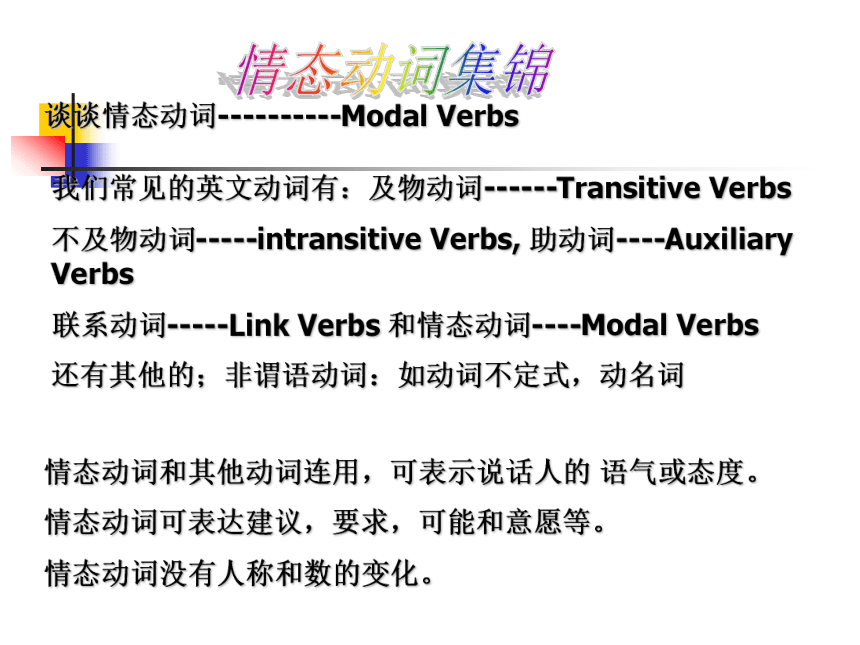
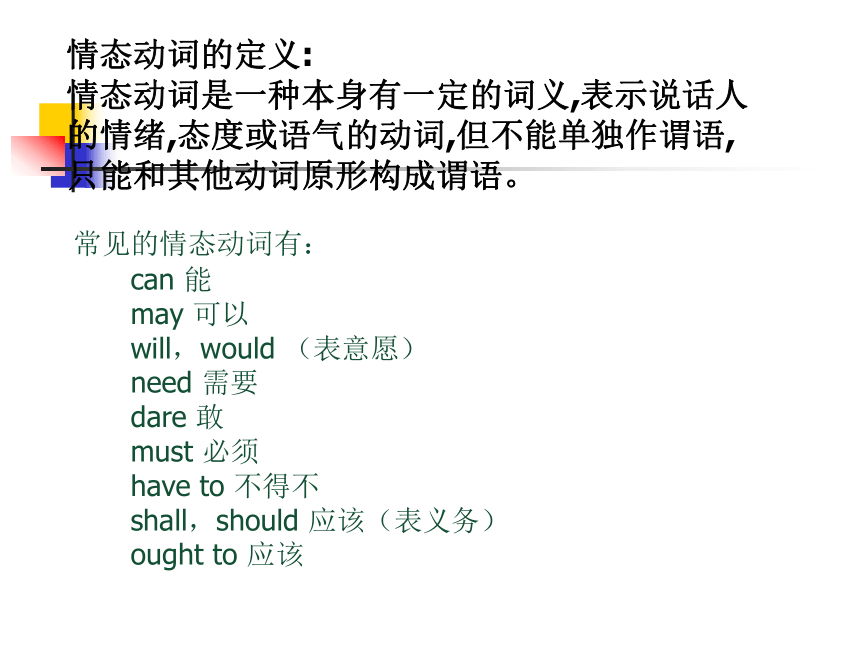
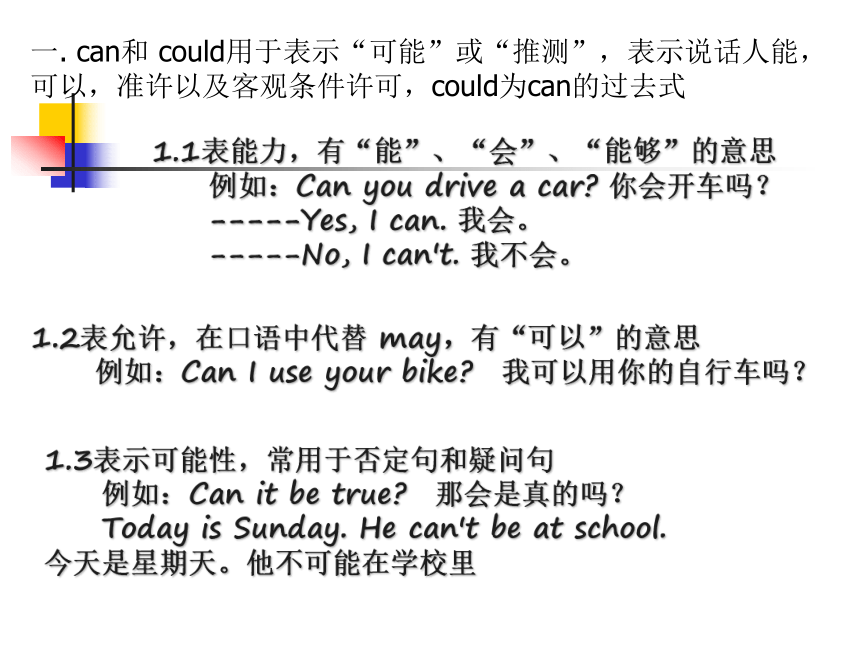
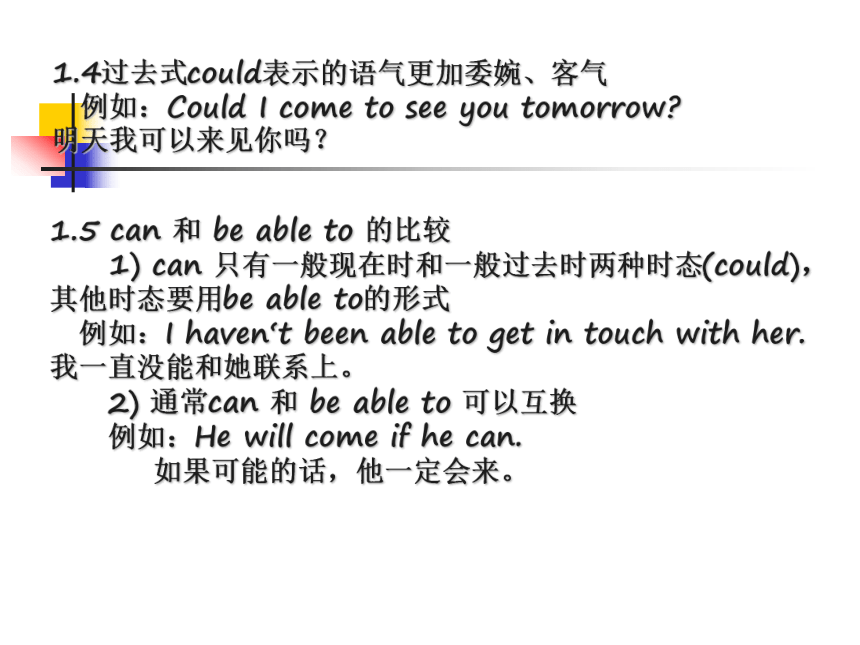

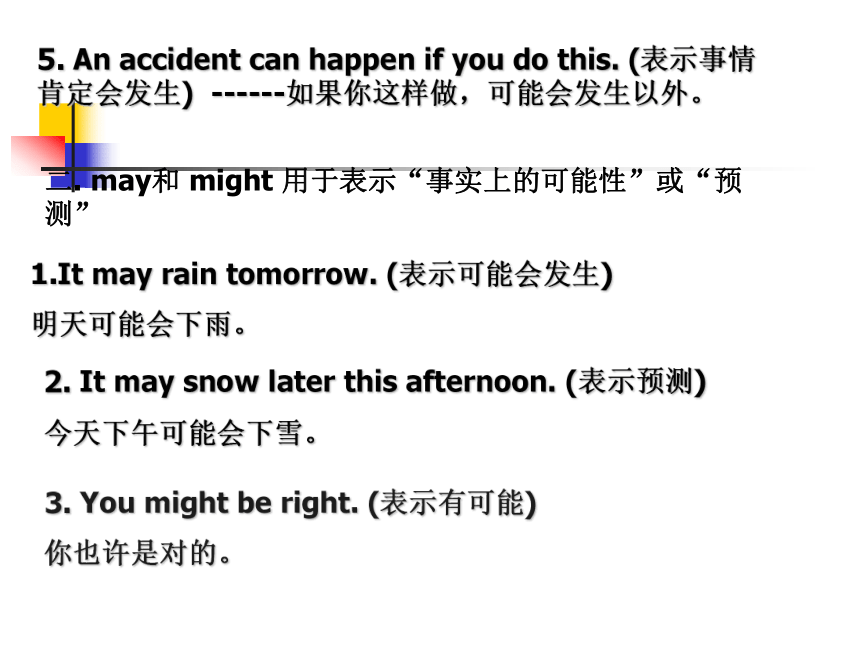
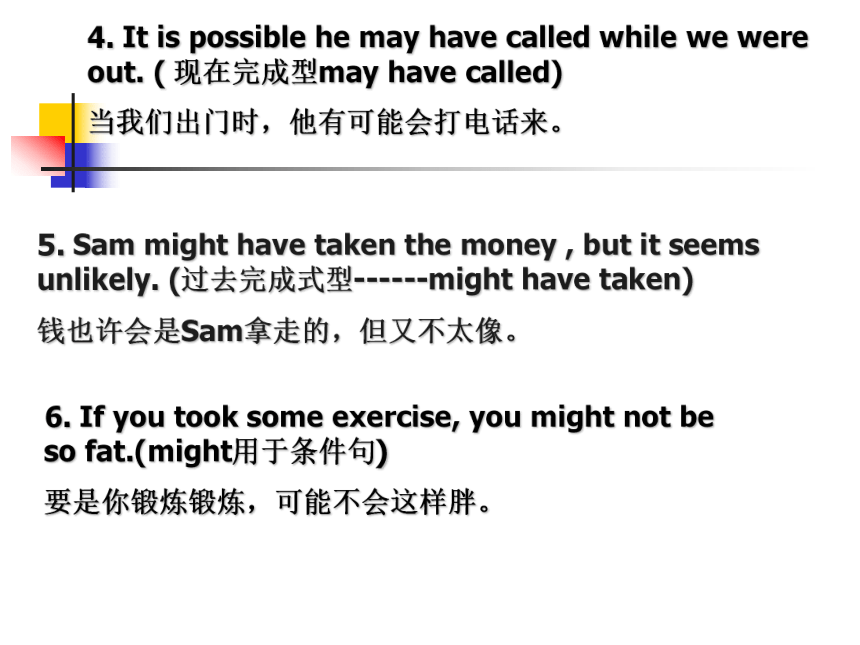
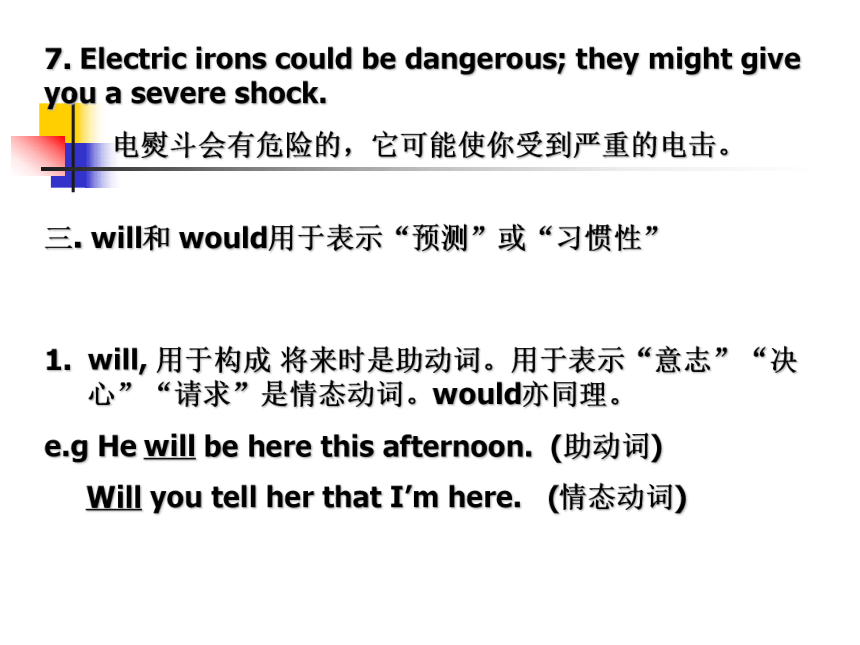
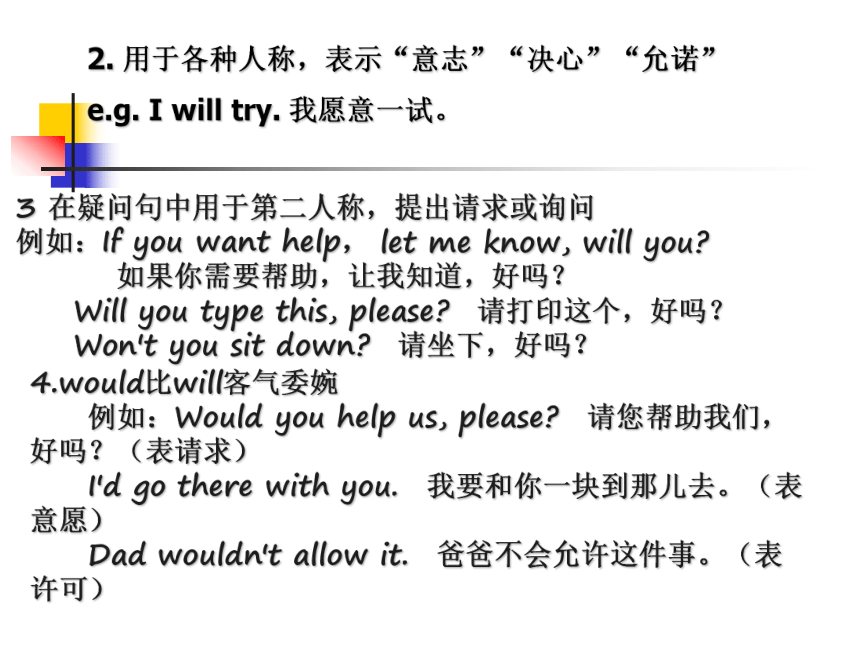
文档简介
课件23张PPT。谈谈情态动词----------Modal Verbs我们常见的英文动词有:及物动词------Transitive Verbs
不及物动词-----intransitive Verbs, 助动词----Auxiliary Verbs
联系动词-----Link Verbs 和情态动词----Modal Verbs
还有其他的;非谓语动词:如动词不定式,动名词情态动词和其他动词连用,可表示说话人的 语气或态度。
情态动词可表达建议,要求,可能和意愿等。
情态动词没有人称和数的变化。情态动词集锦常见的情态动词有: can 能 may 可以 will,would (表意愿) need 需要 dare 敢 must 必须 have to 不得不 shall,should 应该(表义务) ought to 应该情态动词的定义: 情态动词是一种本身有一定的词义,表示说话人的情绪,态度或语气的动词,但不能单独作谓语, 只能和其他动词原形构成谓语。 一. can和 could用于表示“可能”或“推测”,表示说话人能,可以,准许以及客观条件许可,could为can的过去式1.1表能力,有“能”、“会”、“能够”的意思 例如:Can you drive a car? 你会开车吗? -----Yes, I can. 我会。 -----No, I can't. 我不会。 1.2表允许,在口语中代替 may,有“可以”的意思 例如:Can I use your bike? 我可以用你的自行车吗? 1.3表示可能性,常用于否定句和疑问句 例如:Can it be true? 那会是真的吗? Today is Sunday. He can't be at school.
今天是星期天。他不可能在学校里 1.4过去式could表示的语气更加委婉、客气 例如:Could I come to see you tomorrow? 明天我可以来见你吗? 1.5 can 和 be able to 的比较 1) can 只有一般现在时和一般过去时两种时态(could),其他时态要用be able to的形式
例如:I haven‘t been able to get in touch with her. 我一直没能和她联系上。 2) 通常can 和 be able to 可以互换 例如:He will come if he can.
如果可能的话,他一定会来。 can 和could表示“可能” “推测”He can’t be at home. (否定句)
他不可能在家。Can the news be true?
这消息可能是真的吗?Anybody can make a mistake. (只表示理论上的可能性)
任何人都可能犯错误。4. At that time we thought the story could not be true. (表示过去的可能性)
那时我们认为所说的故事不可能是真的。5. An accident can happen if you do this. (表示事情肯定会发生) ------如果你这样做,可能会发生以外。二. may和 might 用于表示“事实上的可能性”或“预测”1.It may rain tomorrow. (表示可能会发生)
明天可能会下雨。2. It may snow later this afternoon. (表示预测)
今天下午可能会下雪。 3. You might be right. (表示有可能)
你也许是对的。4. It is possible he may have called while we were out. ( 现在完成型may have called)
当我们出门时,他有可能会打电话来。5. Sam might have taken the money , but it seems unlikely. (过去完成式型------might have taken)
钱也许会是Sam拿走的,但又不太像。6. If you took some exercise, you might not be so fat.(might用于条件句)
要是你锻炼锻炼,可能不会这样胖。7. Electric irons could be dangerous; they might give you a severe shock.
电熨斗会有危险的,它可能使你受到严重的电击。三. will和 would用于表示“预测”或“习惯性”will, 用于构成 将来时是助动词。用于表示“意志”“决心”“请求”是情态动词。would亦同理。
e.g He will be here this afternoon. (助动词)
Will you tell her that I’m here. (情态动词)2. 用于各种人称,表示“意志”“决心”“允诺”
e.g. I will try. 我愿意一试。3 在疑问句中用于第二人称,提出请求或询问 例如:If you want help, let me know, will you?
如果你需要帮助,让我知道,好吗? Will you type this, please? 请打印这个,好吗? Won't you sit down? 请坐下,好吗? 4.would比will客气委婉 例如:Would you help us, please? 请您帮助我们,好吗?(表请求) I'd go there with you. 我要和你一块到那儿去。(表意愿) Dad wouldn't allow it. 爸爸不会允许这件事。(表许可) 四. shall 和should的用法。1. Each member shall wear a name card. (表示规定) 每一个会员必须配带名卡。 2. I should answer his letter as soon as possible. (表示应该) 我应该尽快给他回信。3. You shouldn't judge a man always by the clothes. (shouldn't “不应该”含有劝告的意思) 你不应该总是以貌取人。 4. The rules shall take effect on Jan. 1st.
(shall 用于规章等,表示义务和规定) 新规则于一月一日起生效。5.Shall I turn on the light, Mom? 妈妈,我把灯打开好吗?(用于征求对方的意见,情态动词) I shall be there. 我会到那儿去的。(表“决心”,情态动词) 6.should用于构成将来时是助动词。should用于表示“应当”“猜测”是情态动词 例如:We thought we should never see you again. 我们以为再也见不到你了。(构成一般过去将来时,助动词) I should write some letters tonight.今晚我得写几封信。(表“应当”,情态动词) They should be there by now.他们现在可能到了。 (表“猜测”,情态动词) 五. must用于表示“必定”“必须”
1.?must表示必须,否定回答时用needn’t.
?mustn’t表示不许可
e.g.1) Must I come tonight? ------No, you needn’t.
2) You mustn't’t smoke in the hospital.2?.must用于肯定句,可以表示推测,翻译为:一定或想必。后面接动词的一般时,表示对现在的推测,接动词的完成式,表示对过去的推测。对过去的推测是考试的重点 1) She?must?live?near?here,?for?she?comes?to?work?on?foot. 2)She?was?absent?from?class.?There?must?have?been? something?wrong?with?her. 3)The?light?was?out.?They?must?have?gone?to?bed. must用法的例子This must be good for you. (must be 肯定)
这肯定对你是有益的。2)All animals must die. (表示必然会发生的事情)
所有的人一定会死。3) Mustn‘t there be a mistake? (mustn’t多用于疑问句)
那肯定会有错误吗?六. ought to 用于表示“想必会” 语气比must弱They ought to be there by now.
他们想必已经到那儿了。2. He ought to stop smoking.
他最好不要抽烟了。情态动词的用法:表示:“许可”“请求”一. can和 could用于表示“许可”“请求”Can I go with you? ( 请求)
我能跟你一起走吗?2. Father said I could go to the cinema. (过去的许可)
爸爸说我可以去看电影。3. Could I ask you something? (请求,用could比can更婉转)
我可以问你一件事情吗?4. You can come in . (表示允许,常见于口语中)
你可以进来。5. You can’t smoke in the meeting room. (can’t 表示“禁止”)
会议室里不准吸烟。6. Can’t you do it now? (表示反问)
你不能现在做吗?二. will和would 表示“请求”Will you kindly tell me the way to the post office? (表示客气请求)
请问邮局怎么走?2. Would you give me your address? (用would比will更客气。)
请你告诉我你的地址,好吗?情态动词表示“推测”的用法。1.情态动词表示“推测”的用法 情态动词表示“推测”时,要记住以下两种推测和形式 推测: ①对过去发生动作或状态的推测; ②对现在状态的推测。 两种形式:①用情态动词加完成时态表示对过去发生动作或状态的推测; ②用情态动词加动词原型表示对现在发生动作或状态的推测。 具体用法如下:9.1 must have done表示过去一定做了什么,语气十分肯定 例如:You must have finished your work.
你一定完成了你的工作。
9.2 can’t have done表示过去不可能做了什么,语气也比较肯定(是上面的否定形式) 例如:He can’t have gone to Beijing, for I had a talk with him just now.
他不可能去过北京,因为我刚和他交谈过。 9.3 needn’t have done表示过去没有必要做什么但已经做了。 例如:You needn’t have come earlier. 你不需要来这么早的。 9.4 should have done过去该做什么但没有做。(含有责备的意思)。 例如:You should have started earlier.你本应该早点开始的。 9.5 shouldn’t have done表示过去不该做什么但做了。(含有责备的意思) 例如:You shouldn’t have helped him, he could
do it himself.你本不该帮助他的,他能自己做。
9.6 ought to have done表示过去该做什么而没有做。(是职责和义务) 例如:You ought to have helped him. (but you didn’t.)你应该帮助他的。 9.7 can/could do sth.表示对现在情况的猜测,常用于否定句、疑问句或感叹句中。 例如:This news can’t be true. 这消息不可能是真的。 9.8 may/might do sth. 表示对现在情况的猜测,常用于肯定句中。 例如:Mr.Wang may know Professor Li’s telephone number.王先生也许知道李教授的电话号码。 1. It?was?very?kind?of?you?to?do?the?washing-up,?but?you?____it. A)?mustn’t?have?done? B)?would?not?have?done C)?might?not?have?done? D)?didn’t?have?to doExercises!2.You?____?all?those?calculations!?We?have?a?computer?to?do?that?sort?of?thing. A)?needn’t?have?done? B)?must?not?have?done C)?shouldn’t?have?done? D)?can?not?have?done 3.Mary’s?score?on?the?test?is?the?highest?in?her?class.?She?____?have?studied?very?hard. A)?may? B)?should?
C)?must? D)?ought?to? 4.This?box?is?too?heavy,?____give?me?a?hand?? A)?would?you?mind? B)?would?you?please C)?will?you?like?to? D)?will?you?please?to? Exercises!
不及物动词-----intransitive Verbs, 助动词----Auxiliary Verbs
联系动词-----Link Verbs 和情态动词----Modal Verbs
还有其他的;非谓语动词:如动词不定式,动名词情态动词和其他动词连用,可表示说话人的 语气或态度。
情态动词可表达建议,要求,可能和意愿等。
情态动词没有人称和数的变化。情态动词集锦常见的情态动词有: can 能 may 可以 will,would (表意愿) need 需要 dare 敢 must 必须 have to 不得不 shall,should 应该(表义务) ought to 应该情态动词的定义: 情态动词是一种本身有一定的词义,表示说话人的情绪,态度或语气的动词,但不能单独作谓语, 只能和其他动词原形构成谓语。 一. can和 could用于表示“可能”或“推测”,表示说话人能,可以,准许以及客观条件许可,could为can的过去式1.1表能力,有“能”、“会”、“能够”的意思 例如:Can you drive a car? 你会开车吗? -----Yes, I can. 我会。 -----No, I can't. 我不会。 1.2表允许,在口语中代替 may,有“可以”的意思 例如:Can I use your bike? 我可以用你的自行车吗? 1.3表示可能性,常用于否定句和疑问句 例如:Can it be true? 那会是真的吗? Today is Sunday. He can't be at school.
今天是星期天。他不可能在学校里 1.4过去式could表示的语气更加委婉、客气 例如:Could I come to see you tomorrow? 明天我可以来见你吗? 1.5 can 和 be able to 的比较 1) can 只有一般现在时和一般过去时两种时态(could),其他时态要用be able to的形式
例如:I haven‘t been able to get in touch with her. 我一直没能和她联系上。 2) 通常can 和 be able to 可以互换 例如:He will come if he can.
如果可能的话,他一定会来。 can 和could表示“可能” “推测”He can’t be at home. (否定句)
他不可能在家。Can the news be true?
这消息可能是真的吗?Anybody can make a mistake. (只表示理论上的可能性)
任何人都可能犯错误。4. At that time we thought the story could not be true. (表示过去的可能性)
那时我们认为所说的故事不可能是真的。5. An accident can happen if you do this. (表示事情肯定会发生) ------如果你这样做,可能会发生以外。二. may和 might 用于表示“事实上的可能性”或“预测”1.It may rain tomorrow. (表示可能会发生)
明天可能会下雨。2. It may snow later this afternoon. (表示预测)
今天下午可能会下雪。 3. You might be right. (表示有可能)
你也许是对的。4. It is possible he may have called while we were out. ( 现在完成型may have called)
当我们出门时,他有可能会打电话来。5. Sam might have taken the money , but it seems unlikely. (过去完成式型------might have taken)
钱也许会是Sam拿走的,但又不太像。6. If you took some exercise, you might not be so fat.(might用于条件句)
要是你锻炼锻炼,可能不会这样胖。7. Electric irons could be dangerous; they might give you a severe shock.
电熨斗会有危险的,它可能使你受到严重的电击。三. will和 would用于表示“预测”或“习惯性”will, 用于构成 将来时是助动词。用于表示“意志”“决心”“请求”是情态动词。would亦同理。
e.g He will be here this afternoon. (助动词)
Will you tell her that I’m here. (情态动词)2. 用于各种人称,表示“意志”“决心”“允诺”
e.g. I will try. 我愿意一试。3 在疑问句中用于第二人称,提出请求或询问 例如:If you want help, let me know, will you?
如果你需要帮助,让我知道,好吗? Will you type this, please? 请打印这个,好吗? Won't you sit down? 请坐下,好吗? 4.would比will客气委婉 例如:Would you help us, please? 请您帮助我们,好吗?(表请求) I'd go there with you. 我要和你一块到那儿去。(表意愿) Dad wouldn't allow it. 爸爸不会允许这件事。(表许可) 四. shall 和should的用法。1. Each member shall wear a name card. (表示规定) 每一个会员必须配带名卡。 2. I should answer his letter as soon as possible. (表示应该) 我应该尽快给他回信。3. You shouldn't judge a man always by the clothes. (shouldn't “不应该”含有劝告的意思) 你不应该总是以貌取人。 4. The rules shall take effect on Jan. 1st.
(shall 用于规章等,表示义务和规定) 新规则于一月一日起生效。5.Shall I turn on the light, Mom? 妈妈,我把灯打开好吗?(用于征求对方的意见,情态动词) I shall be there. 我会到那儿去的。(表“决心”,情态动词) 6.should用于构成将来时是助动词。should用于表示“应当”“猜测”是情态动词 例如:We thought we should never see you again. 我们以为再也见不到你了。(构成一般过去将来时,助动词) I should write some letters tonight.今晚我得写几封信。(表“应当”,情态动词) They should be there by now.他们现在可能到了。 (表“猜测”,情态动词) 五. must用于表示“必定”“必须”
1.?must表示必须,否定回答时用needn’t.
?mustn’t表示不许可
e.g.1) Must I come tonight? ------No, you needn’t.
2) You mustn't’t smoke in the hospital.2?.must用于肯定句,可以表示推测,翻译为:一定或想必。后面接动词的一般时,表示对现在的推测,接动词的完成式,表示对过去的推测。对过去的推测是考试的重点 1) She?must?live?near?here,?for?she?comes?to?work?on?foot. 2)She?was?absent?from?class.?There?must?have?been? something?wrong?with?her. 3)The?light?was?out.?They?must?have?gone?to?bed. must用法的例子This must be good for you. (must be 肯定)
这肯定对你是有益的。2)All animals must die. (表示必然会发生的事情)
所有的人一定会死。3) Mustn‘t there be a mistake? (mustn’t多用于疑问句)
那肯定会有错误吗?六. ought to 用于表示“想必会” 语气比must弱They ought to be there by now.
他们想必已经到那儿了。2. He ought to stop smoking.
他最好不要抽烟了。情态动词的用法:表示:“许可”“请求”一. can和 could用于表示“许可”“请求”Can I go with you? ( 请求)
我能跟你一起走吗?2. Father said I could go to the cinema. (过去的许可)
爸爸说我可以去看电影。3. Could I ask you something? (请求,用could比can更婉转)
我可以问你一件事情吗?4. You can come in . (表示允许,常见于口语中)
你可以进来。5. You can’t smoke in the meeting room. (can’t 表示“禁止”)
会议室里不准吸烟。6. Can’t you do it now? (表示反问)
你不能现在做吗?二. will和would 表示“请求”Will you kindly tell me the way to the post office? (表示客气请求)
请问邮局怎么走?2. Would you give me your address? (用would比will更客气。)
请你告诉我你的地址,好吗?情态动词表示“推测”的用法。1.情态动词表示“推测”的用法 情态动词表示“推测”时,要记住以下两种推测和形式 推测: ①对过去发生动作或状态的推测; ②对现在状态的推测。 两种形式:①用情态动词加完成时态表示对过去发生动作或状态的推测; ②用情态动词加动词原型表示对现在发生动作或状态的推测。 具体用法如下:9.1 must have done表示过去一定做了什么,语气十分肯定 例如:You must have finished your work.
你一定完成了你的工作。
9.2 can’t have done表示过去不可能做了什么,语气也比较肯定(是上面的否定形式) 例如:He can’t have gone to Beijing, for I had a talk with him just now.
他不可能去过北京,因为我刚和他交谈过。 9.3 needn’t have done表示过去没有必要做什么但已经做了。 例如:You needn’t have come earlier. 你不需要来这么早的。 9.4 should have done过去该做什么但没有做。(含有责备的意思)。 例如:You should have started earlier.你本应该早点开始的。 9.5 shouldn’t have done表示过去不该做什么但做了。(含有责备的意思) 例如:You shouldn’t have helped him, he could
do it himself.你本不该帮助他的,他能自己做。
9.6 ought to have done表示过去该做什么而没有做。(是职责和义务) 例如:You ought to have helped him. (but you didn’t.)你应该帮助他的。 9.7 can/could do sth.表示对现在情况的猜测,常用于否定句、疑问句或感叹句中。 例如:This news can’t be true. 这消息不可能是真的。 9.8 may/might do sth. 表示对现在情况的猜测,常用于肯定句中。 例如:Mr.Wang may know Professor Li’s telephone number.王先生也许知道李教授的电话号码。 1. It?was?very?kind?of?you?to?do?the?washing-up,?but?you?____it. A)?mustn’t?have?done? B)?would?not?have?done C)?might?not?have?done? D)?didn’t?have?to doExercises!2.You?____?all?those?calculations!?We?have?a?computer?to?do?that?sort?of?thing. A)?needn’t?have?done? B)?must?not?have?done C)?shouldn’t?have?done? D)?can?not?have?done 3.Mary’s?score?on?the?test?is?the?highest?in?her?class.?She?____?have?studied?very?hard. A)?may? B)?should?
C)?must? D)?ought?to? 4.This?box?is?too?heavy,?____give?me?a?hand?? A)?would?you?mind? B)?would?you?please C)?will?you?like?to? D)?will?you?please?to? Exercises!
